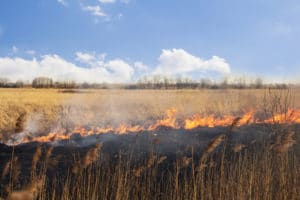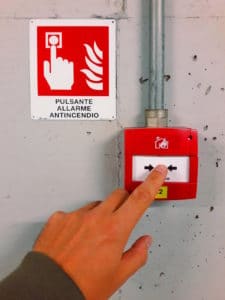Restrict the Spread of House Fires with These Tips
No one wants to think about a fire breaking out in their home, and no one wants to have to deal with a house fire either. Unfortunately, accidents and other events happen that can leadLead is a heavy metal that can be toxic to humans, especiall... More to a fire occurring in your home.
When a fire — even a small one — breaks out, it doesn’t even take 30 seconds for it to become a full-out fire. It won’t take long at all for the flames to engulf your residential property and personal belongings, damaging it all in the process. However, if you know how to respond to a fire, then you can prevent it from spreading and limit the harm that it causes.
Continue reading to learn more about fires, what causes them to spread, and how you can restrict fires from spreading.
What Causes a Fire to Spread?

Many materials such as flammable chemicals, oxygenOxygen is a chemical element essential for combustion and li... More and even water can cause a fire to spread.
Fires keep on burning until they no longer have fuel or until they have been stopped by another force. Furthermore, flames will keep burning until they have completely destroyed your home and all of the belongings inside. There are, however, certain things that will strengthen a fire.
Open Spaces
Similar to how a straight line is the fastest, most direct way to get from a place, a fire in an open space burns quickly because there’s nothing in the way to slow it down. The flames don’t have to go through walls or any other structures to keep spreading throughout your home.
Water
Most of the time, water is used to extinguish a fire’s flames. But there are certain instances where water will not combat the flames and can instead worsen the fire. One such example is a grease fireA grease fire is a fire that occurs when cooking oils or fat... More. Water and oil don’t mix, so the water won’t stop the fire. Rather, the water causes the flames to splatter and reach other surfaces, spreading the damage the fire is causing.
Chemicals and Combustible Matter
A large amount of chemicals are flammable, so they can worsen the flames of a fire. Homes, however, tend to contain many chemicals that can make a fire more aggressive, including paint and cleaning products. Homes also have a lot of combustible matter, such as paper products and furniture, that the fires can easily consume. Unless such materials have been made fire retardantA retardant is a substance applied to slow down or prevent t... More, this allows the fire to have more fuel.
VentilationVentilation is the process of exchanging or circulating air ... More System
The ducts that ventilationVentilation is the process of exchanging or circulating air ... More systems have allow flames, heat, and smoke to travel between the rooms and floors of your home. So if a fire reaches any ducts, there’s the risk of the fire spreading to new areas more quickly.
How Can I Prevent a Fire from Spreading?

Taking safety precautions for your home, providing a proper protection in case of fire is an important matter to consider.
The sooner you’re able to treat a fire’s flames, the less chance there is for it to spread further and cause more damage. If you take active measures, then you give yourself and your home the best chances for making it through a fire with minimal harm.
Be Prepared
Every home should have fire extinguishers so that you’re prepared and able to extinguish a fire in case one does break out. But you need to make sure you have the proper kind of fire extinguisher. Otherwise, it won’t be much help to you in fighting a fire’s flames.
Add Fire Doors
Most homes have doors that cannot contain a fire. They will slow it down but ultimately be destroyed by the flames. However, if you add fire doors to your home, then you can further limit the fire’s ability to travel. There are various types of fire doors, ranging from a rating of 20 minutes to an hour. The rating refers to the amount of time the door is supposed to provide proper protection.
Use Fire-Resistant Materials
If you are building a new home or if you are going to do any reconstructing, then you should use fire-resistant materials to safeguard your property as much as possible. Instead of wood, considering using brick, steel, and concrete.
When choosing textiles and furnishings, buy ones that have been treated with fire retardants. You can also treat them yourself if you don’t already have fire-retardant textiles.
Compartmentalize Your Home
If your home is the site of a fire, you can prevent it from spreading by compartmentalizing the building. This means you divide your home into sections, which you’ll do by closing doors. This will block the fire’s access and limit how quickly it can spread. Even if you don’t have fire doors, it’ll take more time for the flames to get through a closed door than it will to get through an open doorway.
Good Communication
In order to truly prevent a fire from spreading, everyone in your home needs to know what to do. For example, there’s no point in the planning to compartmentalize if, upon evacuating the building, your family and anyone else in your home doesn’t know that they should close doors. That said, have a plan in place, and review it so that everyone knows the proper actions to take.
What Can I Do About Fire Damage?
If a fire breaks out in your home and you’re unable to stop it, then you need to first evacuate your property and ensure everyone’s safety. After that, call your local fire department to have them extinguish the flames.
When the fire has been put out, turn your attention to restorationRestoration is the process of returning a property to its pr... More. You need to contact a fire damage restoration service immediately. Even with the flames extinguished, corrosive byproducts like smoke and sootSoot is fine black particles composed of carbon and other ma... More continue to linger and cause your property damage. This smoke damage can become permanent if not addressed in a timely manner, so you need to act quickly. Professionals will get to work promptly to tend to the sootSoot is fine black particles composed of carbon and other ma... More and smoke damage, clean and restore your belongings and property, and deodorize your home.












